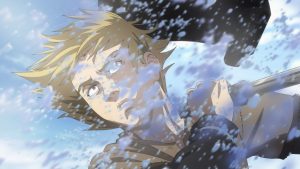 There’s nothing like an enforced absence to make the heart grow fonder. And while I certainly appreciate Vinland Saga all the time (it’s going to be among the last shows in the hat when I’m thinking about those final posts of the year, that’s for sure) a two-week break is a reminder of just how good this series is. Unfortunately we’ve already had to endure a couple of those with Vinland, but if my math is right we should be looking at a straight run to the finish line from here. At which point, of course, the fervent (and most likely fruitless) pining for a second season will begin.
There’s nothing like an enforced absence to make the heart grow fonder. And while I certainly appreciate Vinland Saga all the time (it’s going to be among the last shows in the hat when I’m thinking about those final posts of the year, that’s for sure) a two-week break is a reminder of just how good this series is. Unfortunately we’ve already had to endure a couple of those with Vinland, but if my math is right we should be looking at a straight run to the finish line from here. At which point, of course, the fervent (and most likely fruitless) pining for a second season will begin.
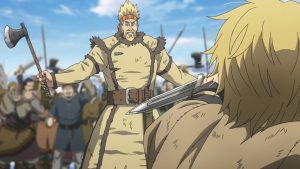 In so many ways this series is really out there where the buses don’t run, and this week’s episode was a perfect example. While there are definite parallels between this series and Golden Kamuy – among them the contrast of intense violence and darkness with absurdist Pythonian comedy – I can’t help but feel that Vinland Saga asks a lot more of its audience than Golden Kamuy does. Both are smart, insightful series and both can be appreciated strictly as entertainment, but it seems to me that in not picking up the moral and intellectual gauntlet their mangaka throw down you’re leaving a lot more on the table here. If you’re not engaging Yukimura Makoto on that level, you’re not experiencing the story he’s trying to tell.
In so many ways this series is really out there where the buses don’t run, and this week’s episode was a perfect example. While there are definite parallels between this series and Golden Kamuy – among them the contrast of intense violence and darkness with absurdist Pythonian comedy – I can’t help but feel that Vinland Saga asks a lot more of its audience than Golden Kamuy does. Both are smart, insightful series and both can be appreciated strictly as entertainment, but it seems to me that in not picking up the moral and intellectual gauntlet their mangaka throw down you’re leaving a lot more on the table here. If you’re not engaging Yukimura Makoto on that level, you’re not experiencing the story he’s trying to tell.
 Actually I think Vinland’s approach here (I assume the manga handled it in the same way) was pretty audacious. As the ultimate fanservice moment was playing out – Thorkell and Thorfinn engaged in their shounen rematch – the real story of the episode was Canute and the priest (whose name is Willbald, which I don’t remember hearing before). Thorfinn is the protagonist here but someone is always coming along to usurp his role as the central character – first Thors, then Askeladd, and now Canute. Both narratives were compelling, but it’s that talk between Willbald and Canute that I’ll remember (and which I think was the real point of this episode).
Actually I think Vinland’s approach here (I assume the manga handled it in the same way) was pretty audacious. As the ultimate fanservice moment was playing out – Thorkell and Thorfinn engaged in their shounen rematch – the real story of the episode was Canute and the priest (whose name is Willbald, which I don’t remember hearing before). Thorfinn is the protagonist here but someone is always coming along to usurp his role as the central character – first Thors, then Askeladd, and now Canute. Both narratives were compelling, but it’s that talk between Willbald and Canute that I’ll remember (and which I think was the real point of this episode).
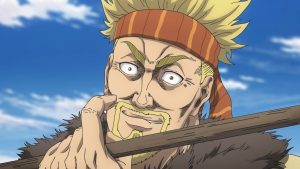 It would probably be fair to say that neither Thorfinn or Thorkell are exactly philosophers, but to be fair this is about as thoughtful as we’ve seen the giant. He states that his reason for fighting Thorfinn (in addition to entertainment) is that he might find what he himself is missing – but Thorfinn is missing it too. If Thorkell is looking for the meaning of being a true warrior, he’s asking the wrong person – but the person he should have asked is no longer around. Thorfinn remembers, but has lived his life choosing to try and forget.
It would probably be fair to say that neither Thorfinn or Thorkell are exactly philosophers, but to be fair this is about as thoughtful as we’ve seen the giant. He states that his reason for fighting Thorfinn (in addition to entertainment) is that he might find what he himself is missing – but Thorfinn is missing it too. If Thorkell is looking for the meaning of being a true warrior, he’s asking the wrong person – but the person he should have asked is no longer around. Thorfinn remembers, but has lived his life choosing to try and forget.
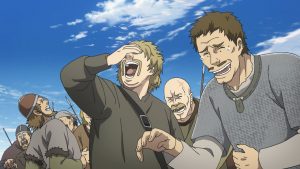 The really sad part about all this for me is that Thorfinn could gain a great deal by sitting down and talking with Thorkell, and I’d even go so far as to say the converse it true as well. There’s really no point to this fight. What’s it for – Askeladd’s sake? Fuck that. Thorkell’s addiction to violence? Fuck that. But that’s the point of course – that there is no point. The world these men are living in is insane, roiled by unspeakable violence and cruelty, and none of the various quests for meaning – revenge, Valhalla, Avalon, Heaven – seem to make any difference here on Earth.
The really sad part about all this for me is that Thorfinn could gain a great deal by sitting down and talking with Thorkell, and I’d even go so far as to say the converse it true as well. There’s really no point to this fight. What’s it for – Askeladd’s sake? Fuck that. Thorkell’s addiction to violence? Fuck that. But that’s the point of course – that there is no point. The world these men are living in is insane, roiled by unspeakable violence and cruelty, and none of the various quests for meaning – revenge, Valhalla, Avalon, Heaven – seem to make any difference here on Earth.
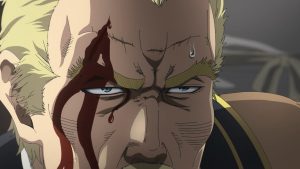 One could go pretty deep into the reeds breaking down what happened between Canute and Willbald (and Bjorn). After a dream where Ragnar offers his farewells, Canute is left facing the reality of a berserker Bjorn destroying what’s left of Askeladd’s men and the priest with his head in a barrel. Willbald even denies that what Ragnar felt for Canute was love – he watched 62 innocents die for him, after all – and his tells the lad of his view that only in death can mankind espouse God’s love. Not through salvation, but through becoming one with the Earth and ceasing to exist as a consciousness. To exist is to create evil, in effect.
One could go pretty deep into the reeds breaking down what happened between Canute and Willbald (and Bjorn). After a dream where Ragnar offers his farewells, Canute is left facing the reality of a berserker Bjorn destroying what’s left of Askeladd’s men and the priest with his head in a barrel. Willbald even denies that what Ragnar felt for Canute was love – he watched 62 innocents die for him, after all – and his tells the lad of his view that only in death can mankind espouse God’s love. Not through salvation, but through becoming one with the Earth and ceasing to exist as a consciousness. To exist is to create evil, in effect.
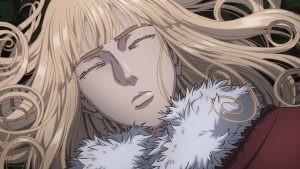 Willbald may seem pretty much around the bend but the irony of this is that the views he expresses to Canute, while undeniably presented in nihilist terms, are actually rather Buddhist. That’s especially true when he describes all human love as “prejudice” – a parent or a lover or a loyal subject, this so-called “love” just makes humans prioritize the object of their prejudice over other, equally deserving humans. This is very far away from a Platonic ideal (which is in many ways the underpinning of all Western views on love) but quite close to the idea that love for other people is one of the temptations that keep humans bound to the physical world and prevent them from reaching enlightenment.
Willbald may seem pretty much around the bend but the irony of this is that the views he expresses to Canute, while undeniably presented in nihilist terms, are actually rather Buddhist. That’s especially true when he describes all human love as “prejudice” – a parent or a lover or a loyal subject, this so-called “love” just makes humans prioritize the object of their prejudice over other, equally deserving humans. This is very far away from a Platonic ideal (which is in many ways the underpinning of all Western views on love) but quite close to the idea that love for other people is one of the temptations that keep humans bound to the physical world and prevent them from reaching enlightenment.
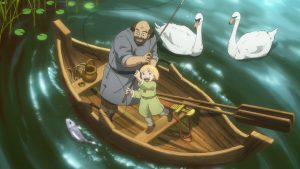 What matters for the narrative, of course, is how Canute reacts. As Thorkell seemingly decides he’s played with Thorfinn long enough and decisively halts their duel (for now), Canute reaches a sort of enlightenment. One might call it a humanist one (which places him rather ahead of his time) but he basically rejects the ideal of striving for an impossible redemption and embraces the notion of fighting the unfairness of God’s creation and trying to make mortal existence as bearable as possible. In doing so he also embraces his role as a ruler – which will certainly place his prejudices at odds with the ambitions of his father, among others. It also seemingly places Canute at the heart of the narrative, at least for now – another phase in a very big story which sees the nominal hero’s journey relegated to a supporting role.
What matters for the narrative, of course, is how Canute reacts. As Thorkell seemingly decides he’s played with Thorfinn long enough and decisively halts their duel (for now), Canute reaches a sort of enlightenment. One might call it a humanist one (which places him rather ahead of his time) but he basically rejects the ideal of striving for an impossible redemption and embraces the notion of fighting the unfairness of God’s creation and trying to make mortal existence as bearable as possible. In doing so he also embraces his role as a ruler – which will certainly place his prejudices at odds with the ambitions of his father, among others. It also seemingly places Canute at the heart of the narrative, at least for now – another phase in a very big story which sees the nominal hero’s journey relegated to a supporting role.


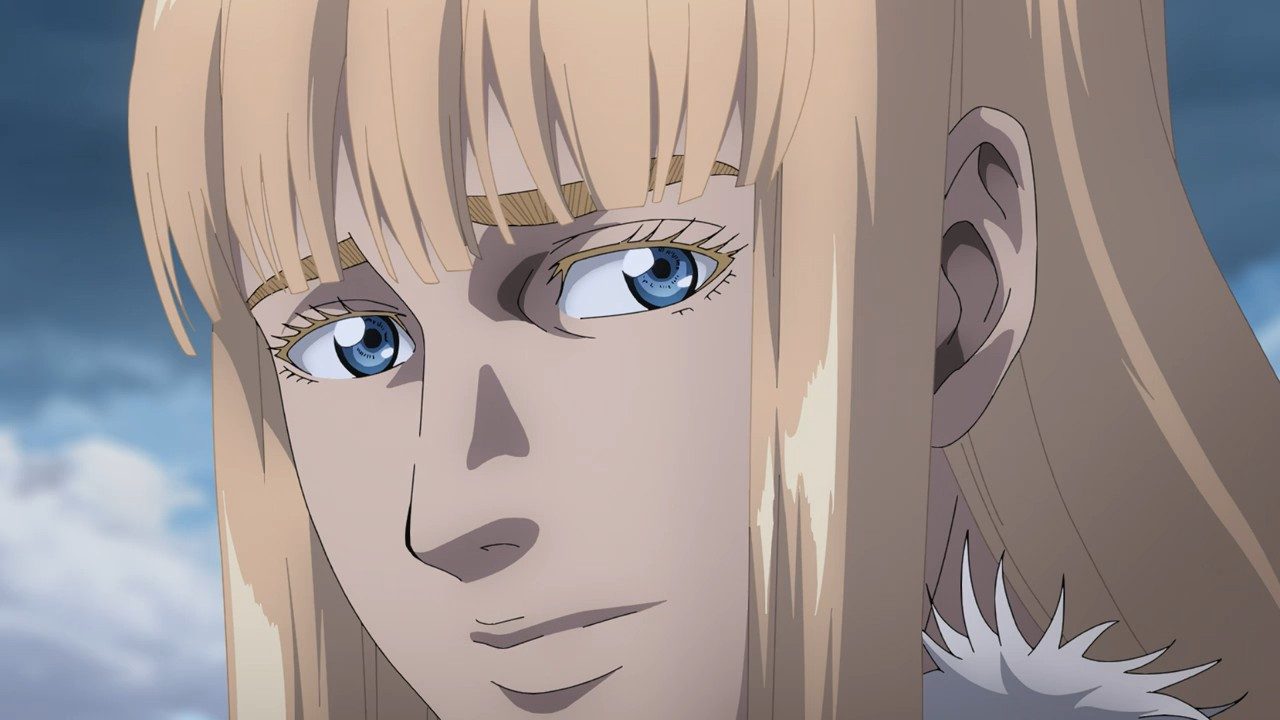
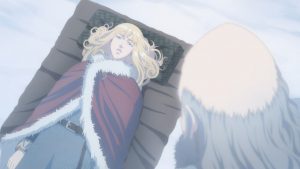
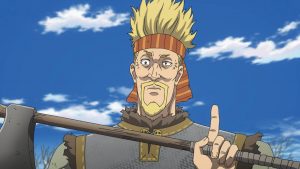
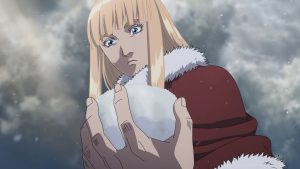
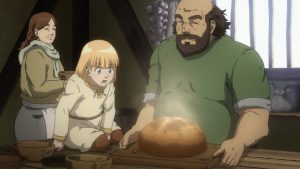
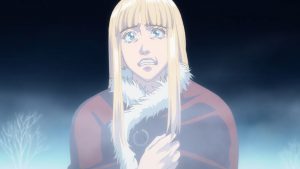
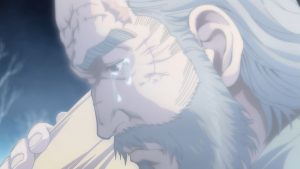
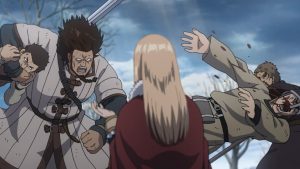
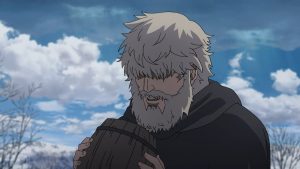
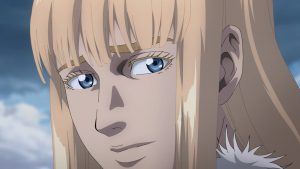
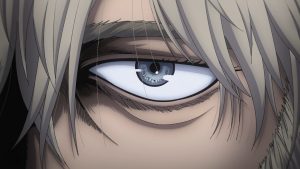
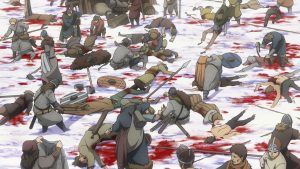
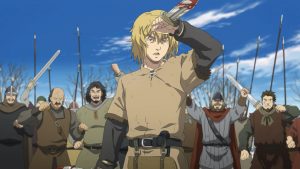

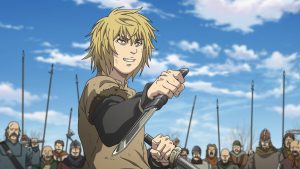
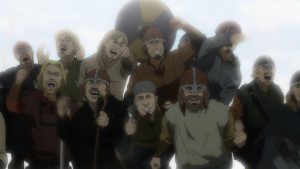
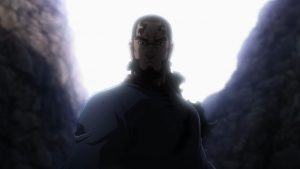
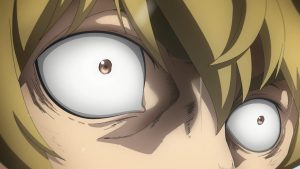
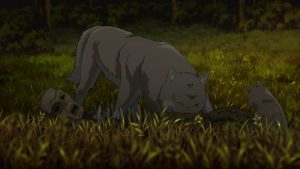
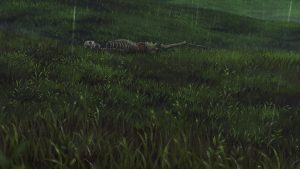
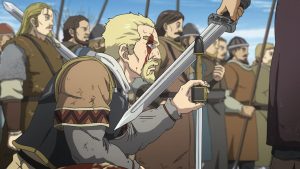
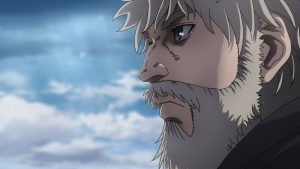
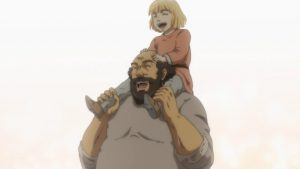
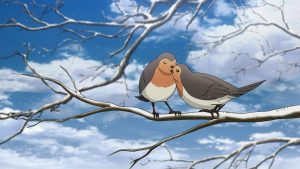
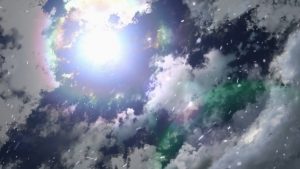

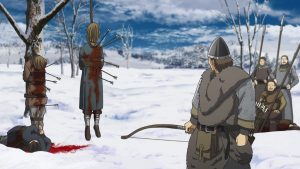
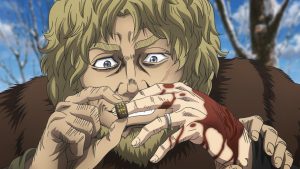
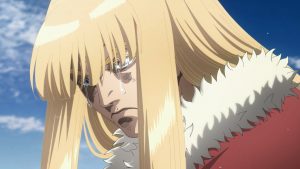
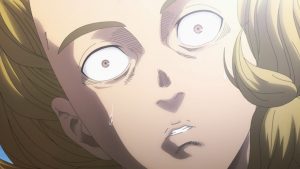
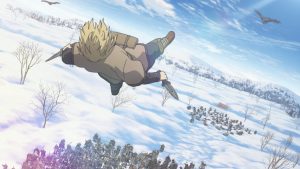
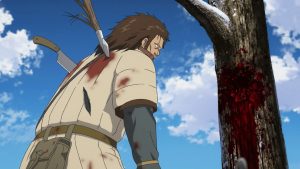
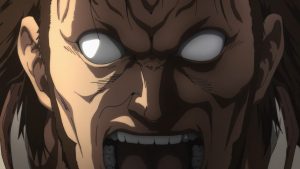
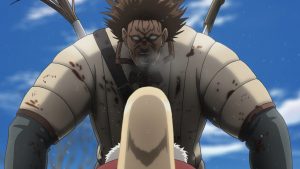
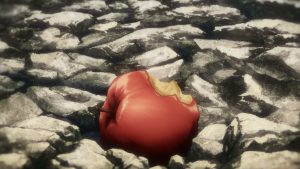
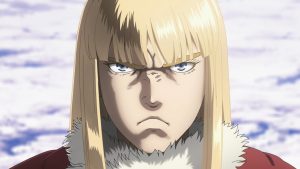
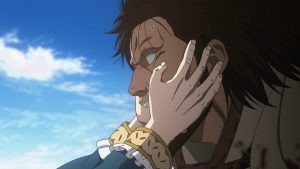
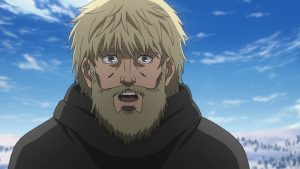
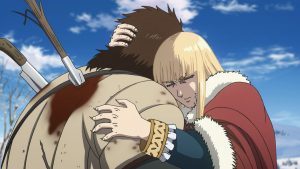
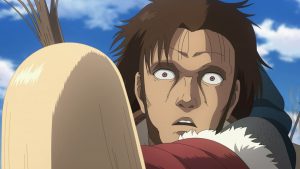
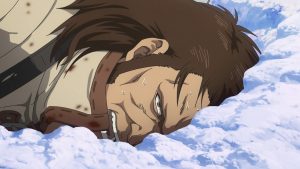
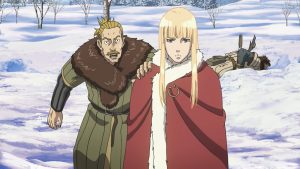
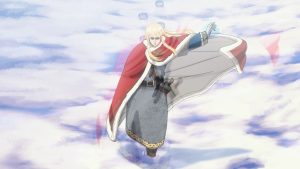
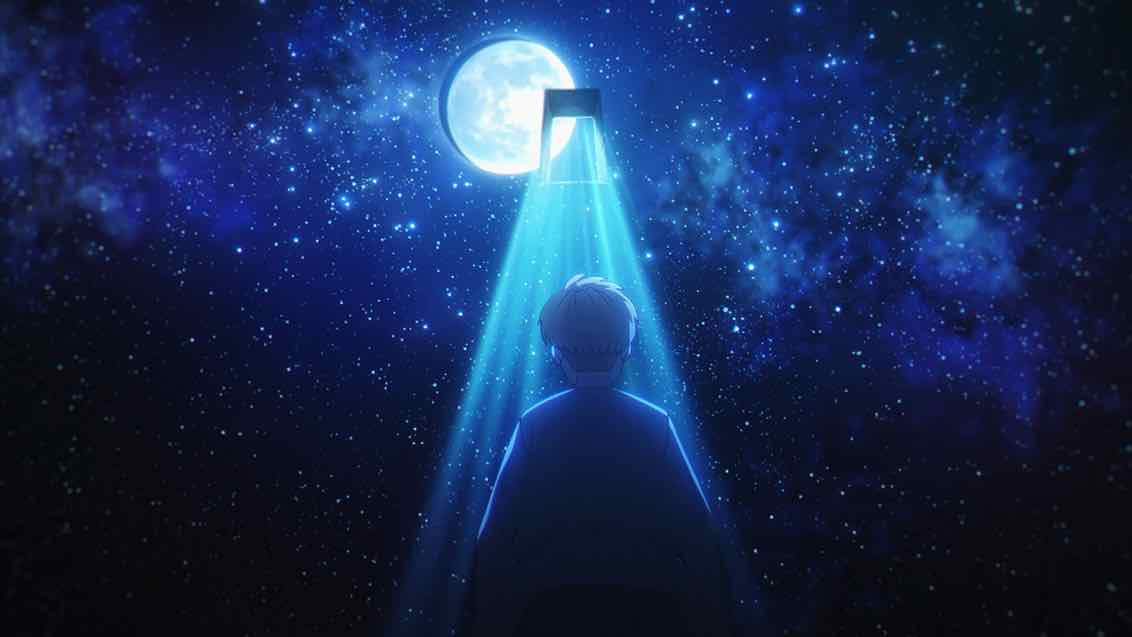
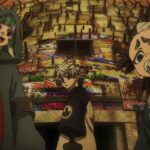
Marty
November 18, 2019 at 9:18 pmNot gonna lie, I get the feeling the 2-week break worked against this episode for a lot of people looking forward to the Thorfinn vs Thorkell Rematch, but Canute’s development was not only necessary but fascinating (I guess they should’ve been prepared for this considering Askeladd’s background episode in Wales came after an ending implying a battle was gonna break out with the ambush).
Guardian Enzo
November 18, 2019 at 9:38 pmWell, if it means anything the episode reviews on MAL (pound of salt) are sky-high as usual for VS.
Derrick
November 18, 2019 at 10:29 pmI can imagine the confusion in anime world when an anime don’t have tsunderes,mary sues gary stus, faux philosophical rambling, loli pandering etc.
just people being people in raw,violent yet beautiful world.
Yann
November 19, 2019 at 4:11 amBest episode for me so far. I wish they didn’t have the superhero stuff like people flying in the air hundreds of meters away but… The rest is so strong that I can ignore it.
Tim
November 19, 2019 at 4:29 amJust thought I’d share my thoughts on Canute and the priest. First, I’m assuming this priest is a heretical Catholic, just based off the time period. I thought his teachings were interesting because, while heretical, there was a hint of Catholic teaching within. We’re taught to love indiscriminately, which the priest says is humanly impossible, but there are many definitions of love. For example, Ragnar did love Canute, in a familial way, but he didn’t love in the way the priest liked. Whether it was just Amazon’s translation or not, I didn’t like the use of the word discrimination, because that implies that he was focusing on keeping certain people out of his heart, not keeping specific people in his heart. As a side note, when the priest mentioned the idea of loving indiscriminately, the first thing that came to mind was the old mother earlier in the series(was it ep. 6?). I was kinda upset that there’s no one to really debate the priest, or at least no one with as great wisdom(as in he knows how to defend his argument). I’d love to see that come at some point though, but from what I know of the author, he’s not nearly so optimistic. I just want thorfinn to understand where he’s wrong. I love this show but it’s so depressing.
Ekin
November 19, 2019 at 12:23 pmOnce again proving that Vinland Saga is a badass anime.
Yukie
November 19, 2019 at 7:30 pmThis is why I didn’t like Wit studio’s decision for the OPs. It markets the anime as some sort of action-packed, Viking show, but in reality, it’s historical fiction with a few saga-like flairs here and there (hence why I have no problems with Thorkell and his superhuman characteristics). It’s Thorfinn’s journey and this is the prologue: all the people that become main influences in his life-Thors, Askeladd, and Canute are the focus here. A lot of the most interesting aspects of this show are introspective, so it worried me when so many people I see on the web recommend this show by saying it’s similar to Berserk (just because they’re both mature and “medieval”).
Overzealous rant aside, the nature scenes are once again phenomenally done. I’m back to holding my breath to see how the remaining episodes will be executed.
Guardian Enzo
November 19, 2019 at 7:58 pmThat sky shot…
https://lostinanime.com/wp-content/uploads/2019/11/Vinland-Saga-18-32.jpg
Yukie
November 20, 2019 at 11:14 pmThat was my favorite one
Earthlingzing
November 24, 2019 at 10:08 pmI agree with that point about the OPs, and I feel its part of a bigger problem where some of the directorial choices in the show have made it a lot more generic. Such as, the exaggerated violence in scenes, the character designs in the show and how colorful everything generally is. I very much prefer the way things were handled in the Planetes anime, where the philosophical themes felt like they resonated much more in that series. I can’t deny that the nature shots here are great though.